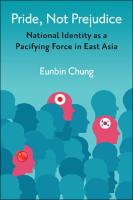Pride, Not Prejudice
External Review of Whole Manuscript
National Identity as a Pacifying Force in East Asia
| dc.contributor.author | Chung, Eunbin | |
| dc.date.accessioned | 2022-01-15T05:31:31Z | |
| dc.date.available | 2022-01-15T05:31:31Z | |
| dc.identifier | OCN: 1280153066 | |
| dc.identifier.uri | https://library.oapen.org/handle/20.500.12657/52461 | |
| dc.description.abstract | As shown by China’s relationship to Japan, and Japan’s relationship to South Korea, even growing regional economic interdependencies are not enough to overcome bitter memories grounded in earlier wars, invasions, and periods of colonial domination. Although efforts to ease historical animosity have been made, few have proven to be successful in Northeast Asia. In previous research scholars anticipated an improvement in relations through thick economic interdependence or increased societal contact. In economic terms, however, Japan and China already trade heavily: Japan has emerged as China’s largest trading partner and China as second largest to Japan. Societal contact is already intense, as millions of Chinese, Koreans, and Japanese visit one another’s countries annually as students, tourists, and on business trips. But these developments have not alleviated international distrust and negative perception, or resolved disagreement on what constitutes “adequate reparation” regarding the countries’ painful history. Noticing clashes of strong nationalisms around the world in areas like Northeast Asia, numerous studies have suggested that more peaceful relations are likely only if countries submerge or paper over existing national identities by promoting universalism. Pride, Not Prejudice argues, to the contrary, that affirmation of national identities may be a more effective way to build international cooperation. If each national population reflects on the values of their national identity, trust and positive perception can increase between countries. This idea is consistent with the theoretical foundation that those who have a clear, secure, and content sense of self, in turn, can be more open, evenhanded, and less defensive toward others. In addition, this reduced defensiveness also enhances guilt admission by past “inflictors” of conflict and colonialism. Eunbin Chung borrows the social psychological theory of self-affirmation and applies it to an international context to argue that affirmation of a national identity, or reflecting on what it means to be part of one’s country, can increase trust, guilt recognition, and positive perception between countries. | |
| dc.language | English | |
| dc.subject.classification | thema EDItEUR::J Society and Social Sciences::JP Politics and government | en_US |
| dc.subject.classification | thema EDItEUR::J Society and Social Sciences::JP Politics and government::JPS International relations::JPSD Diplomacy | en_US |
| dc.subject.other | Political Science | |
| dc.subject.other | World | |
| dc.subject.other | Asian | |
| dc.subject.other | Political Science | |
| dc.subject.other | International Relations | |
| dc.subject.other | Diplomacy | |
| dc.subject.other | Political Science | |
| dc.title | Pride, Not Prejudice | |
| dc.title.alternative | National Identity as a Pacifying Force in East Asia | |
| dc.type | book | |
| oapen.identifier.doi | https://doi.org/10.3998/mpub.12010257 | |
| oapen.relation.isPublishedBy | e07ce9b5-7a46-4096-8f0c-bc1920e3d889 | |
| oapen.relation.isFundedBy | b818ba9d-2dd9-4fd7-a364-7f305aef7ee9 | |
| oapen.relation.isbn | 9780472902934 | |
| oapen.collection | Knowledge Unlatched (KU) | |
| oapen.imprint | University of Michigan Press | |
| oapen.identifier | https://openresearchlibrary.org/viewer/3470f3ea-0196-4ccf-9d1e-8015a0757be8 | |
| oapen.identifier.isbn | 9780472902934 | |
| peerreview.anonymity | Double-anonymised | |
| peerreview.id | d98bf225-990a-4ac4-acf4-fd7bf0dfb00c | |
| peerreview.open.review | No | |
| peerreview.publish.responsibility | Scientific or Editorial Board | |
| peerreview.review.decision | Yes | |
| peerreview.review.stage | Pre-publication | |
| peerreview.review.type | Full text | |
| peerreview.reviewer.type | External peer reviewer | |
| peerreview.title | External Review of Whole Manuscript | |
| oapen.review.comments | The proposal was selected by the acquisitions editor who invited a full manuscript. The full manuscript was reviewed by two external readers using a double-blind process. Based on the acquisitions editor recommendation, the external reviews, and their own analysis, the Executive Committee (Editorial Board) of U-M Press approved the project for publication. |

